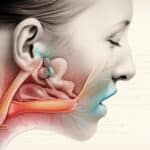Unmasking the Mystery: Why Is My Tinnitus So Loud Today and How to Tame It
- Get link
- X
- Other Apps
Table Of Contents
Introduction
Have you ever wondered, why is my tinnitus so loud today?” Well, you’re not alone in this. Millions of people across the globe are battling the same concern. It’s an exasperating sensation like a persistent buzzing, ringing, or humming in your ears that just won’t stop. But what is causing this sudden loudness in your tinnitus and is it something to worry about? Stick around as we delve into this perplexing issue.
Understanding Tinnitus
Tinnitus is the sensation of hearing sound in your ears or head when no external sound exists. By some stroke of inconvenience, this phantom noise often amplifies, leaving many asking, “Why does tinnitus get louder?” Annoyingly, the severity and volume of tinnitus can fluctuate without apparent cause, adding to the frustration.
It could range from a low roar to a high squeal, appearing to originate in one ear or both, inside the head, or at a distance. But one critical fact to be aware of is that tinnitus is not a condition itself but rather a symptom of an underlying condition like age-related hearing loss, circulatory system disorder, or ear injury.
High-Pitched Ringing: A Common Symptom
Many tinnitus sufferers report hearing a high-pitched ringing sound. This is among the common tinnitus frequencies that people experience. But there’s a lingering question we often hear – is it a signal of something serious? The truth is, high-pitched tinnitus is just a symptom and not a disease. Importantly, it’s often not associated with a severe health issue, though it can be incredibly annoying and significantly affect one’s quality of life. For an in-depth understanding of this symptom, check out the post on Tinnitus High-Pitched Ringing on our blog.
Common Causes for Sudden Loudness in Tinnitus
You might experience a sudden worsening of your tinnitus for several reasons. It might be due to factors like exposure to loud noise, increased stress levels, high blood pressure, earwax build-up, or certain medications. Don’t fret about it though; understanding what provokes the abrupt loudness could help manage it better.
Loud Noise Exposure
Sure, a concert last night was spectacular, but your tinnitus has surprisingly spiked. This reaction is because loud noises can, and dampen the ear’s sound-receiving capabilities and worsen your tinnitus. Using ear protection and avoiding extremely loud environments would be a smart move.
Increased Stress Levels
High blood pressure, or hypertension, can intensify tinnitus for some people. The connection between stress and tinnitus is undeniable. Thus, lifestyle modifications such as regular exercise and a healthy diet could do you a world of good.
Earwax Build-up
Did you know that excess earwax can cause tinnitus to suddenly get louder or even provoke it? Earwax protects your ear canal from becoming too dry, but when the ear produces too much, it can become hard and infest the ear causing hearing loss and creating those pesky ringing sounds in your ear.
Medications
Some medications can also exacerbate tinnitus. As such, if your tinnitus volume increases after introducing any new drug, it might be worth discussing the issue with your doctor.
To know more about how loud noise impacts tinnitus, don’t forget to read the blog on Tinnitus caused by Loud Noise.
Hearing Loss and Its Connection with Tinnitus
Are you aware that hearing loss and tinnitus often go hand in hand? When your ability to hear external sounds gets affected, you might become more aware of the internal sounds, thus amplifying your perception of tinnitus. As straightforward as it sounds, the relationship between the two is quite complex and is often intertwined. It’s similar to losing a star from the night sky; the darker it gets, the brighter the other stars appear. The reduction in external noise can appear to make tinnitus all the more loud and bothersome.
Make no mistake, this doesn’t mean that everyone with tinnitus will definitely experience hearing loss or vice versa. Both are individual conditions that can exist independently but are certainly connected. More on this topic is available on our blog on High-Frequency Hearing Loss and Tinnitus.
The Changing Pitch of Tinnitus
Have you ever noticed a change in the pitch of your tinnitus? One day it is a low buzzing sound, and the next, it evolves into a high-pitched ringing. This change in the pitch is not uncommon and is another complexity of this audiological and neurological issue. While changes in pitch might alarm you, it’s usually just a symptom and not indicative of a worsening condition.
Interestingly, grasping an understanding of the frequency of your tinnitus could help your clinician better understand your experience. This insight could be crucial in managing your tinnitus and determining the best course of action. This is where things like tinnitus pitch matching procedure come in, which is an assessment tool that helps to identify the frequency and loudness of your tinnitus. Find out more on our posts, Does Tinnitus Change Pitch? and Tinnitus Pitch Matching Procedure.
All in all, while there’s no standard experience of tinnitus, understanding the condition and its peculiarities could provide some comfort when the ringing just won’t stop. It’s sobering to note that we’re on the journey with you, and together, we can better navigate through it.
Managing High-Pitched Tinnitus
Maybe you’re thinking, “Is there a way out of this constant high-pitched ringing in my ears?” Yes, there certainly is! Managing high-pitched tinnitus involves a mix of lifestyle changes, therapies, and sometimes, medical treatments.
Right out the gate, it’s essential to avoid any potential triggers such as loud noises and stressors. Additionally, applying some relaxation techniques like yoga, deep breathing, or even good old-fashioned exercise can be beneficial. Remember, stress and anxiety can amplify your awareness of tinnitus, so staying relaxed should be a priority.
Moreover, hearing aids are often very effective in reducing tinnitus symptoms. They enhance external sounds, thus helping the brain focus on those rather than the internal noises. But it doesn’t stop there! Cognitive behavioral therapy, sound therapy, and other tinnitus relief techniques have shown real promise too. Check out our detailed post on High-Pitched Tinnitus for more tips and strategies.
Conclusion
Living with tinnitus, particularly when it’s at its loudest, can indeed pose challenges. However, it’s crucial to remember that this is a journey that many have navigated successfully, and you can too. While tinnitus might not have a one-size-fits-all cure just yet, there are certainly many ways to manage and lessen the impact it has on your life.
Understanding more about your tinnitus (like its triggers and pitch), learning how lifestyle factors affect it, and implementing various management strategies can significantly help improve your quality of life. It’s like braving a rough storm – it might seem daunting at first, but once you understand the wind and the waves, you can effectively journey through it.
Most importantly, don’t hesitate to seek professional help if your tinnitus is causing significant distress. There are many health professionals out there who can provide valuable guidance in managing your condition. Remember, you are not alone in this journey, and support is available. Stay positive, stay informed, and above all, tune out the noise and tune into life.
Why Is My Tinnitus So Loud Today - Frequently Asked Questions (FAQ)
Tinnitus is the sensation of hearing sound in your ears or head when no external sound exists. The severity and volume of tinnitus can fluctuate without apparent cause, which can be due to factors like exposure to loud noise, increased stress levels, high blood pressure, earwax build-up, or certain medications.
Sudden loudness in tinnitus can be caused by exposure to loud noise, increased stress levels, high blood pressure, earwax build-up, or certain medications. Understanding these triggers can help manage tinnitus better.
Hearing loss and tinnitus often go hand in hand. When your ability to hear external sounds gets affected, you might become more aware of the internal sounds, thus amplifying your perception of tinnitus. However, this doesn’t mean that everyone with tinnitus will definitely experience hearing loss or vice versa.
Yes, the pitch of your tinnitus can change. It can range from a low buzzing sound to a high-pitched ringing. This change in pitch is not uncommon and is another complexity of tinnitus. While changes in pitch might alarm you, it’s usually just a symptom and not indicative of a worsening condition.
Managing high-pitched tinnitus involves a mix of lifestyle changes, therapies, and sometimes, medical treatments. Avoiding potential triggers such as loud noises and stressors, applying relaxation techniques like yoga or deep breathing, and using hearing aids can be beneficial. Cognitive behavioral therapy, sound therapy, and other tinnitus relief techniques have also shown promise.
The post Unmasking the Mystery: Why Is My Tinnitus So Loud Today and How to Tame It appeared first on Pulsatile Tinnitus Treatments News - Tinnitus Relief.
Related posts:
https://ift.tt/wbHiE03
#tinnitus #pusatiletinnitus #earringing #whatistinnitus #howtostoptinnitus
- Get link
- X
- Other Apps



Comments
Post a Comment